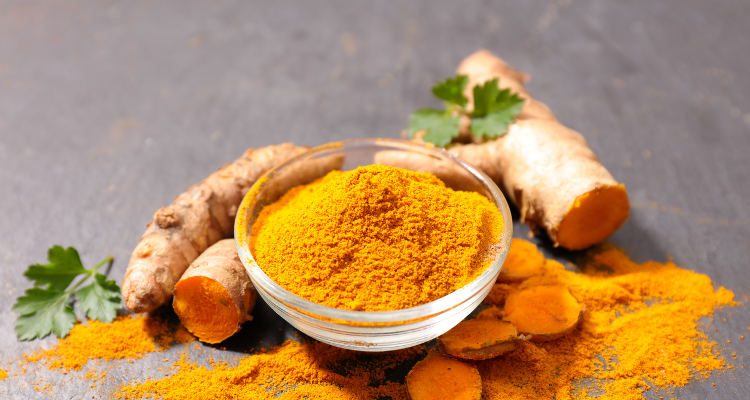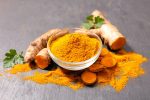
Turmeric is a very common herb and one of the most powerful, too. The golden-colored spice has a pepper-like aroma and sharp taste. Turmeric’s use is not limited to adding flavor to many dishes as turmeric benefits your health in numerous ways, too, owing to its rich nutrient content.
- Protein,
- Dietary fiber
- Niacin
- Vitamin C
- Vitamin E
- Vitamin K
- Iron
- Magnesium
- Potassium
- Calcium
- Copper
- Zinc
Turmeric spice contains the healing compound curcumin, and studies have suggested it can be more advantageous than many prescription drugs.
Health Benefits of Turmeric
1. Quickly Heals Wounds
Turmeric is considered an effective disinfectant and can be used as a natural antiseptic and antibacterial agent. If you get a cut or burn, sprinkling turmeric powder on the wound could help it to heal faster. It may be used in psoriasis treatment or to assist in repairing damaged skin.
2. Immunity Booster
Turmeric contains lipopolysaccharide and antibacterial, antiviral, and antifungal agents that can help boost the immune system and provide protection against colds, coughs, and flu.
A person with a stronger immune system has a lesser chance of being infected with viral diseases. In the case of cold and cough, regularly drinking warm milk mixed with a teaspoon of turmeric may help with the infection.
3. Helps Control Diabetes
Turmeric is thought to moderate insulin levels and increase the effects of medications used to treat diabetes. Research also suggests that taking turmeric could help prevent diabetes. Other studies indicate that turmeric extract could help stabilize blood sugar levels and make diabetes more manageable.
4. Relieves Arthritis Symptoms
Turmeric can potentially treat inflammation linked to osteoarthritis and rheumatoid arthritis with its anti-inflammatory properties. These agents also destroy free radicals in the body, which damage the body cells.
People suffering from rheumatoid arthritis have been observed to get greater relief from joint pains if they consume turmeric regularly.
5. Helps Prevent Cancer
Turmeric’s curcumin may help to prevent prostate cancer. It’s also been shown to stop prostate cancer cell growth and destroy cancer cells. According to research, turmeric is one of the best protectors against tumors caused by radiation.
6. Reduces Cholesterol Levels
The spice appears to reduce serum cholesterol levels in animal models. This effect helps in maintaining proper cholesterol levels and, in turn, prevents many cardiovascular diseases and serious cholesterol-related health problems.
7. Prevents Alzheimer’s Disease
One of the major causes of Alzheimer’s disease is brain inflammation. A mouse study found that turmeric helped to remove the build-up of plaque in the brain and improve the flow of oxygen, which helps in slowing down Alzheimer’s disease.
8. Weight Loss Stimulator
Turmeric increases the flow of bile, which, in turn, helps to break down fat cells stored in the body. This helps to achieve and maintain a healthy body weight. It is suggested to have one teaspoon of turmeric powder with every meal.
9. Helps Improve Digestion
Turmeric energizes the gallbladder to produce bile, which improves digestion. Turmeric is also used to reduce symptoms of bloating and gas. In case of any digestive problems, turmeric must be consumed in raw form to reap maximum benefits.
Turmeric Benefits over Medicine
1. Painkillers
Much anecdotal evidence suggests turmeric has the ability to manage pain. In addition to treating diabetic pain conditions, it’s also believed to treat a wide array of other pain conditions. Because of turmeric’s anti-inflammatory benefits, the spice can be used to treat severe burns rather than using dangerous anti-inflammatory medications.
2. Steroids
Steroids have a number of side effects listed by the UK’s National Health Services (NHS), while curcumin doesn’t have any. Steroids’ side effects include:
- Acne
- Asthma
- Cancer
- Cataracts
- Delayed wound healing
- Diabetes onset
- Glaucoma
- Hypertension (high blood pressure)
- Increased appetite (oftentimes leading to increased weight)
- Indigestion
- Insomnia
Some symptoms like chronic inflammation of the eye, which was commonly treated by using steroids, are now being treated with curcumin.
3. Anti-inflammatory
Curcumin has a good ability to control inflammation. Oncogene published the results of a study stating that among all the anti-inflammatory medications in the world, aspirin and ibuprofen are the least effective, while curcumin is the most effective. Inflammation causes diseases like cancer, ulcerative colitis, arthritis, high cholesterol, and chronic pain.
4. Anti-Depressants
There hasn’t been much research conducted on humans; however, studies on animals have shown curcumin is effective in reducing depression symptoms. Apparently, curcumin is as effective as “Prozac” in managing depression.
5. Anti-Coagulants/Anti-Platelets
The medicines used to slow and prevent blood clotting like aspirin, clopidogrel, diclofenac, enoxaparin, and ibuprofen have dangerous side effects like excessive bleeding, hemorrhage, back pain, and headaches.
6. Arthritis Management
With arthritis drugs (diclofenac sodium), people may develop a leaky gut and heart disease, whereas with curcumin, treatment is safe and doesn’t have any adverse side effects. The countless benefits of curcumin help to treat people suffering from different types of arthritis.
Turmeric Side Effects
When exposed to the skin, some people have reported allergic reactions to turmeric like a mild, itchy rash. Turmeric is extremely beneficial when taken in small amounts, but high doses can cause the following:
- Increased risk of bleeding
- Increased enzyme levels in liver function tests
- Hyperactive gallbladder contractions
- Hypotension (lowered blood pressure)
- Nausea
- Diarrhea
- Uterine contractions in pregnant women
- Increased menstrual flow
People taking medications and anti-coagulants like aspirin, clopidogrel, and warfarin must be careful about using turmeric in their food or supplementing with it. It also affects medications such as non-steroidal, anti-inflammatory drugs. Those taking prescribed medication should include ample amounts of fresh, organic turmeric in their diets to reduce the adverse effects of such medicines.
3 Healthy Turmeric Recipes
1. Tropical Carrot, Ginger, and Turmeric Smoothie
Ingredients:
- ½ cup frozen mango chunks
- ⅔ cup coconut water
- ¾ teaspoon finely grated peeled ginger
- 1 blood or navel orange, peel and white pith removed
- 1 large carrot, scrubbed, coarsely chopped
- 1 tablespoon shelled raw hemp seeds
- 1 ½ teaspoons finely grated peeled turmeric
- Pinch of cayenne pepper
- Pinch of kosher salt
Directions:
Purée orange, carrot, mango, coconut water, hemp seeds, ginger, turmeric, cayenne, salt, and a half cup of ice in a blender until smooth. Serve in tall glasses.
2. Iced Turmeric Latte
Ingredients:
- 1 cup cashew milk
- 1 teaspoon finely grated fresh ginger
- 1 teaspoon fresh lemon juice
- 2 pinches of ground cardamom
- 4 teaspoons finely grated fresh turmeric
- 2 teaspoons finely grated palm sugar or raw sugar
- Pinch of flaky sea salt
- Lemon wedge (for serving)
Directions:
Whisk together milk, turmeric, ginger, lemon juice, cardamom, palm sugar, and salt in a small bowl until sugar and salt have dissolved. Let it stand for five minutes for the flavors to meld.
Strain through a fine-mesh sieve into a cup, and extract juices by pressing on the solids and discard the solids. Fill a glass with ice. Pour latte over and serve with lemon wedge.
3. The Cough Suppressant
Ingredients:
- ¼ cup honey, preferably raw
- ¼ cup unsweetened almond milk
- ½ teaspoon black peppercorns
- 1 bunch oregano
- 1 bunch thyme
- 1 1-inch piece ginger, peeled, grated
- 1 1-inch piece turmeric, peeled, grated
- 1 small garlic clove, grated
- 3 tablespoons fresh lime or lemon juice
Directions:
Gently press oregano and thyme with a wooden spoon to release oils. In a medium saucepan, heat herbs, ginger, turmeric, peppercorns, and eight cups of water until an instant-read thermometer reads around 130°. Do not boil. Reduce the temperature to low and let mixture steep six minutes.
Add almond milk, garlic, honey, and citrus juice, and stir to dissolve honey. Strain in a pitcher and press the herbs to extract the juices. Serve hot.
Turmeric tea benefits the immune system. The spice can also be taken in form of supplements, but it is always best to consult your doctor first.
Related:
Sources:
Angel, T., “Can Turmeric Help Manage or Prevent Diabetes?,” Health Line web site, September 22, 2013; http://www.healthline.com/health/diabetes/turmeric-and-diabetes#Management5, last accessed January 13, 2017













